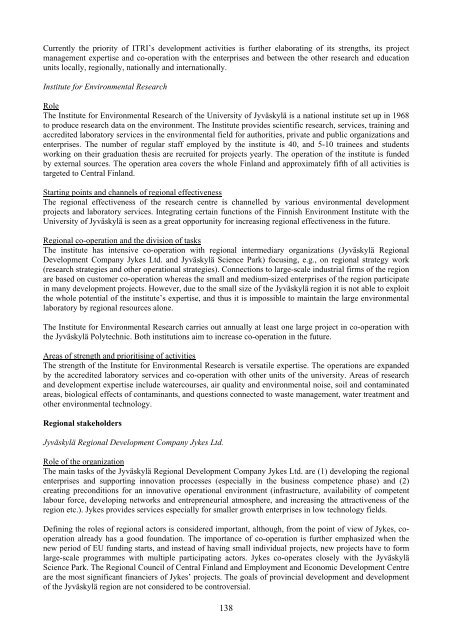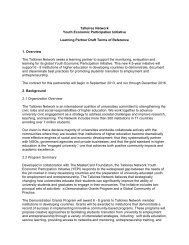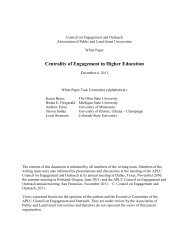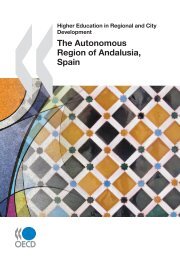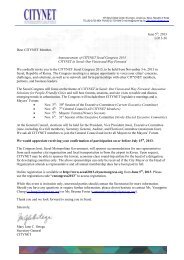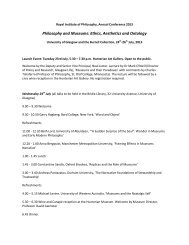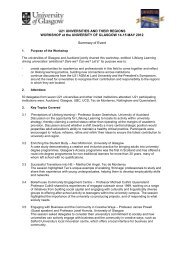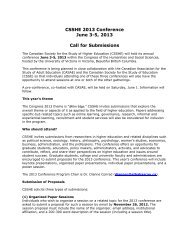with private sector is case-specific, but it is considered important to get enterprises to utilize more activelythe expertise of IER.The IER has had co-operation with Jyväskylä Polytechnic for example in the fields of vocational teachereducation and researcher training. However, launching joint R&D projects has been difficult despite theefforts (resource problem). The co-operation with polytechnic is expected to increase in the future.Developing on-the-job learning as a part of teacher education could be one significant field for co-operation.Areas of strength and prioritising of activitiesThe Institute for Educational Research aims at specialising in four areas: higher education, international andnational evaluation of education, links between education and working life (including vocational education),and exploiting information technology in education.Information Technology Research Institute (ITRI)RoleInformation Technology Research Institute (ITRI) is one of the three departments of the Faculty ofInformation Technology at the University of Jyväskylä. As a research unit of the IT faculty, ITRI’s objectiveis to conduct research and provide services for business and public organizations in the fields of expertise ofthe IT faculty.The institute operates mainly at the national and regional levels. Its task from the regional point of view is totransfer technological knowledge to the industry and to develop local economy and business. The crossdisciplinaryexpertise at the University of Jyväskylä is reflected in the skills of ITRI´s personnel.Starting points and channels of regional effectivenessITRI has a significant role as an intermediate organization between the university and industry and thesociety. In that sense, it has a major role in universities’ “third task” and has a significant impact on societyand economy, regionally and nationally as well.The regional effectiveness of the research institute is based on good contacts to enterprises and joint projectswith them. In addition to National Technology Agency of <strong>Finland</strong> (Tekes) and EC research funding (FP6)based research projects (currently 4 ongoing), ITRI is carrying out several (currently 6 ongoing) EUstructural funding (ESR and EAKR) based projects (MMEP, Opinpolku, OILI, MYLLY, MOTTO, NASTA)which have a significant impact for the regional economy and business.<strong>Region</strong>al co-operation and the division of tasksThe research projects in ITRI have usually some level of collaboration with other national and internationalresearch institutes and researchers. The level of collaboration has varied from joint projects to commoninformal research co-operation at individual level. <strong>Region</strong>ally, collaboration with Jyväskylä Polytechnic inproject work has gone well. This collaboration will be further developed in the future.ITRI has good relationships with the industry and co-operation with the regional enterprises is close. Duringits existence, since 1989, more than three hundred enterprises have been involved in ITRI’s projects.<strong>Region</strong>al, and small and medium size, enterprises form a major part of this collaboration. The projects ofITRI offer a good possibility for the small and medium size enterprises for networking and common R&Dactivities, as they have otherwise often limited resources for their development.Important partners of the public sector include several municipalities and the <strong>Region</strong>al Council of Central<strong>Finland</strong>. Co-operation with intermediary organizations in the region is based mainly on project funding.Areas of strength and prioritising of activitiesITRI´s main expertise comprises of e-learning, organizational information management, enterprisearchitectures, mobile applications and business networks. In research, the strengths of ITRI are in designing,building and implementing information systems, and in software engineering, especially from the point ofview of methods and processes.137
Currently the priority of ITRI’s development activities is further elaborating of its strengths, its projectmanagement expertise and co-operation with the enterprises and between the other research and educationunits locally, regionally, nationally and internationally.Institute for Environmental ResearchRoleThe Institute for Environmental Research of the University of Jyväskylä is a national institute set up in 1968to produce research data on the environment. The Institute provides scientific research, services, training andaccredited laboratory services in the environmental field for authorities, private and public organizations andenterprises. The number of regular staff employed by the institute is 40, and 5-10 trainees and studentsworking on their graduation thesis are recruited for projects yearly. The operation of the institute is fundedby external sources. The operation area covers the whole <strong>Finland</strong> and approximately fifth of all activities istargeted to Central <strong>Finland</strong>.Starting points and channels of regional effectivenessThe regional effectiveness of the research centre is channelled by various environmental developmentprojects and laboratory services. Integrating certain functions of the Finnish Environment Institute with theUniversity of Jyväskylä is seen as a great opportunity for increasing regional effectiveness in the future.<strong>Region</strong>al co-operation and the division of tasksThe institute has intensive co-operation with regional intermediary organizations (Jyväskylä <strong>Region</strong>alDevelopment Company Jykes Ltd. and Jyväskylä Science Park) focusing, e.g., on regional strategy work(research strategies and other operational strategies). Connections to large-scale industrial firms of the regionare based on customer co-operation whereas the small and medium-sized enterprises of the region participatein many development projects. However, due to the small size of the Jyväskylä region it is not able to exploitthe whole potential of the institute’s expertise, and thus it is impossible to maintain the large environmentallaboratory by regional resources alone.The Institute for Environmental Research carries out annually at least one large project in co-operation withthe Jyväskylä Polytechnic. Both institutions aim to increase co-operation in the future.Areas of strength and prioritising of activitiesThe strength of the Institute for Environmental Research is versatile expertise. The operations are expandedby the accredited laboratory services and co-operation with other units of the university. Areas of researchand development expertise include watercourses, air quality and environmental noise, soil and contaminatedareas, biological effects of contaminants, and questions connected to waste management, water treatment andother environmental technology.<strong>Region</strong>al stakeholdersJyväskylä <strong>Region</strong>al Development Company Jykes Ltd.Role of the organizationThe main tasks of the Jyväskylä <strong>Region</strong>al Development Company Jykes Ltd. are (1) developing the regionalenterprises and supporting innovation processes (especially in the business competence phase) and (2)creating preconditions for an innovative operational environment (infrastructure, availability of competentlabour force, developing networks and entrepreneurial atmosphere, and increasing the attractiveness of theregion etc.). Jykes provides services especially for smaller growth enterprises in low technology fields.Defining the roles of regional actors is considered important, although, from the point of view of Jykes, cooperationalready has a good foundation. The importance of co-operation is further emphasized when thenew period of EU funding starts, and instead of having small individual projects, new projects have to formlarge-scale programmes with multiple participating actors. Jykes co-operates closely with the JyväskyläScience Park. The <strong>Region</strong>al Council of Central <strong>Finland</strong> and Employment and Economic Development Centreare the most significant financiers of Jykes’ projects. The goals of provincial development and developmentof the Jyväskylä region are not considered to be controversial.138
- Page 1 and 2:
OECD/IMHE ‐ Supporting thecontrib
- Page 3 and 4:
SUMMARYTogether with 13 other regio
- Page 5 and 6:
8.2 Increasing the regional effecti
- Page 7 and 8:
I INTRODUCTION1.1 Strengthening the
- Page 9 and 10:
development. The aim is that region
- Page 11 and 12:
The self-evaluation considered here
- Page 13 and 14:
densely populated cities in Finland
- Page 15 and 16:
1,9 %1,7 %1,5 %1,3 %Population chan
- Page 17 and 18:
The share of jobs in primary produc
- Page 19 and 20:
New pillars of future’s developme
- Page 21 and 22:
Jyväskylä0,60,91,11,0Central Finl
- Page 23 and 24:
2.4 Governance StructureMunicipalit
- Page 25 and 26:
of its development outside the cent
- Page 27 and 28:
III CHARACTERISTICS OF THE HIGHER E
- Page 29 and 30:
continuing education and open unive
- Page 31 and 32:
The Science and Technology Policy C
- Page 33 and 34:
3.2 Regional dimension within the n
- Page 35 and 36:
order to respond to the challenges
- Page 37 and 38:
14001200Master's degreesDoctoratesN
- Page 39 and 40:
900800Youth graduatedAdult graduate
- Page 41 and 42:
provide information for the basis o
- Page 43 and 44:
CabinetParliamentSTPCSteering (andf
- Page 45 and 46:
5,04,0Billion euros3,02,01,00,083 8
- Page 47 and 48:
The number of refereed articles is
- Page 49 and 50:
Centre of expertisePaper industryBi
- Page 51 and 52:
The Institute for Environmental Res
- Page 53 and 54:
and systematic gradually progressin
- Page 55 and 56:
are seen to be very important chann
- Page 57 and 58:
Internal support units of HEIsThe F
- Page 59 and 60:
of interviewed HEI staffs, the coop
- Page 61 and 62:
areas of the region’s Centre of E
- Page 63 and 64:
system of Jyväskylä and the HEIs
- Page 65 and 66:
V CONTRIBUTION OF TEACHING AND LEAR
- Page 67 and 68:
esources to establish new activitie
- Page 69 and 70:
The main problem for the Finnish la
- Page 71 and 72:
longer. 2.5% of the Jyväskylä Pol
- Page 73 and 74:
activities. As a part of the new qu
- Page 75 and 76:
education programmes consisting of
- Page 77 and 78:
the TE-Centre of Central Finland an
- Page 79 and 80:
practices in the provision of educa
- Page 81 and 82:
Reason forskillupgradingDescription
- Page 83 and 84:
Strengths+ HEIs are actively confro
- Page 85 and 86:
taxation, to lower the unemployment
- Page 87 and 88: Box 6.2 The WIRE -projects: Support
- Page 89 and 90: indoor ice-skating rink, the Rauhal
- Page 91 and 92: The School of Cultural Studies at t
- Page 93 and 94: the number of registered customers
- Page 95 and 96: Box 6.9 Environmental management in
- Page 97 and 98: Strengths+ The significance of HEIs
- Page 99 and 100: eferring to the regional developmen
- Page 101 and 102: Key topics relating to changes in t
- Page 103 and 104: participation in the decision makin
- Page 105 and 106: in the strategy-making process. The
- Page 107 and 108: 7.5 Critical points in promoting th
- Page 109 and 110: 7.Cooperation in strategies concern
- Page 111 and 112: egion is according to national and
- Page 113 and 114: oundaries for further developmental
- Page 115 and 116: joining resources and operations by
- Page 117 and 118: Discussion proposal 15: To ensure d
- Page 119 and 120: achieved by the horizontal utilizat
- Page 121 and 122: Appendix 2 Information on data used
- Page 123 and 124: and finding synergy between the oth
- Page 125 and 126: School of BusinessRoleThe School of
- Page 127 and 128: The challenge of the school from re
- Page 129 and 130: developing wellness and environment
- Page 131 and 132: Faculty of EducationRoleThe Faculty
- Page 133 and 134: and/or graduation thesis is a signi
- Page 135 and 136: Areas of strength and prioritising
- Page 137: Agora Center’s partners from the
- Page 141 and 142: Weak spots and areas to develop in
- Page 143 and 144: Employment and Economic Development
- Page 145 and 146: Appendix 3 Analysis of the most sig
- Page 147 and 148: Appendix 4 Regional effects (input-
- Page 149 and 150: The overall value of production cre
- Page 151 and 152: Appendix 5 Reform of regional struc
- Page 153 and 154: Appendix 7 Provision of education i
- Page 155 and 156: Appendix 8 Statistical information
- Page 157 and 158: Appendix 10 Statistics on financing
- Page 159 and 160: Appendix 12 Labour market activity
- Page 161 and 162: Appendix 14 Master’s Programmes a
- Page 163 and 164: Uusiutuvan energian tutkimusohjelma
- Page 165 and 166: BIBLIOGRAPHYAcademy of Finland (200


